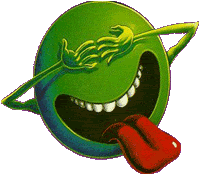Wiki Presentation
 In many of the more relaxed civilizations on the Outer Eastern Rim of the Galaxy, the Hitchhiker's Guide has already supplanted the great Encylopedia Galactica as the standard repository of all knowledge and wisdom. For though it has many omissions and contains much that is apocryphal, or at least wildly inaccurate, it scores over the older, more pedestrian work in two important respects. First, it is slightly cheaper, and second, it has the words DON'T PANIC inscribed in large friendly letters on its cover.
In many of the more relaxed civilizations on the Outer Eastern Rim of the Galaxy, the Hitchhiker's Guide has already supplanted the great Encylopedia Galactica as the standard repository of all knowledge and wisdom. For though it has many omissions and contains much that is apocryphal, or at least wildly inaccurate, it scores over the older, more pedestrian work in two important respects. First, it is slightly cheaper, and second, it has the words DON'T PANIC inscribed in large friendly letters on its cover.Douglas Adams, Hitchhiker’s Guide to the Galaxy
Wiki – from the Hawaiian word for fast, refers to a type of web software that allows users to create and edit Web page content. It’s simple to use and requires no knowledge of HTML. If so desired, a wiki can allow anyone to edit, delete or modify content that has been placed on the Web site, including the work of previous authors. It retains historical versions of pages, and can also easily incorporate links, RSS feeds, blogs, podcasts, etc. It especially lends itself to collaborative writing.
Wikipedia – It’s a beautiful thing, but caveat lector
It’s called open source because it’s written, edited and policed by a global group of volunteers, but, unlike Linux, an open source software, it has no central editor. Wikipedia is collaborative and consists of self-correcting, living documents that can be updated quickly.
Accuracy
Unlike encylopedias, which are written by credentialed experts and overseen by an editor, Wikipedia relies on many contributors (Wikipedians) who are amateurs, and their contributions can carry as much weight as that of experts. It has even been accused of being anti-elitist, and has had serious problems with trolls, practical jokers, vandals and point of view pushers. Because many entries are made anonymously, the system lacks accountability. To battle these challenges, Wikipedia has established an arbitration committee. On each entry, you can see the process by which Wikipedia settles disputes over content. Each entry has a discussion list where you can watch the debate unfold. An entry will also warn the reader in bold print if it contains original research or unverified claims. (See Bigfoot) Controversial, politically sensitive entries have a special holding place where entries and edits are monitored by volunteers who have established themselves in the Wikipedian community.
Timeliness
Current events like the Madrid Bombings had an entry up within the day.
Length
Because encylopedias have an editor, their entries are brief and concise. Wikipedia entries tend to ramble. A 200 page exegesis on Star Trek – is that really necessary? Other subjects’ entries are scant or non existent.
Content
Wikipedia’s nearly million are an often bizarre mix of high, low and pop culture. Entries also place information in a pop cultural context: for an entry like Moby Dick, you will see how many times it’s referenced in Star Trek episodes, Japanese video games, comic books, and the Simpsons. Wikipedia does contain a lot of technical, instructional and cultural information that traditional encyclopedias might not. (See slash fiction; Reed-Solomon error correction; and Car battery, which includes information on how to care for and change your car battery; list of Comcast stations)
A powerful Wikipedia feature is that it contains links to articles and websites. Its bibliographies also have links to more information about the source. (Britannica now has weblinks, and has teamed up with EBSCO so you can do a journal search)
Whether this is fair or not, Wikipedia has neither the respect nor trust of the academic community. Because it still has the reputation and perception of unreliability, I wouldn’t source it for homework. I also wouldn’t use it to settle a bet involving large sums of money, or to fact check for a newspaper article (New York Times explicitly bans its reporters from doing so). But for a starting point, or for technical, obscure and pop culture information, it is a fantastic source, one upon which the public is relying more and more. With more than a million entries, it is currently the 37th most visited website on the internet.
Here is a link to my Del.icio.us bookmarks.

